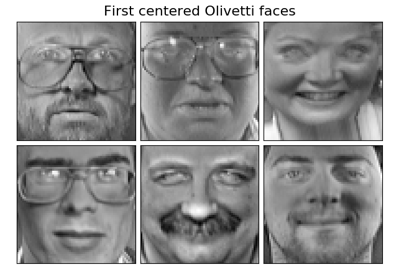sklearn.decomposition.MiniBatchSparsePCA¶
-
class
sklearn.decomposition.MiniBatchSparsePCA(n_components=None, alpha=1, ridge_alpha=0.01, n_iter=100, callback=None, batch_size=3, verbose=False, shuffle=True, n_jobs=None, method='lars', random_state=None, normalize_components='deprecated')[source]¶ Mini-batch Sparse Principal Components Analysis
Finds the set of sparse components that can optimally reconstruct the data. The amount of sparseness is controllable by the coefficient of the L1 penalty, given by the parameter alpha.
Read more in the User Guide.
- Parameters
- n_componentsint,
number of sparse atoms to extract
- alphaint,
Sparsity controlling parameter. Higher values lead to sparser components.
- ridge_alphafloat,
Amount of ridge shrinkage to apply in order to improve conditioning when calling the transform method.
- n_iterint,
number of iterations to perform for each mini batch
- callbackcallable or None, optional (default: None)
callable that gets invoked every five iterations
- batch_sizeint,
the number of features to take in each mini batch
- verboseint
Controls the verbosity; the higher, the more messages. Defaults to 0.
- shuffleboolean,
whether to shuffle the data before splitting it in batches
- n_jobsint or None, optional (default=None)
Number of parallel jobs to run.
Nonemeans 1 unless in ajoblib.parallel_backendcontext.-1means using all processors. See Glossary for more details.- method{‘lars’, ‘cd’}
lars: uses the least angle regression method to solve the lasso problem (linear_model.lars_path) cd: uses the coordinate descent method to compute the Lasso solution (linear_model.Lasso). Lars will be faster if the estimated components are sparse.
- random_stateint, RandomState instance or None, optional (default=None)
If int, random_state is the seed used by the random number generator; If RandomState instance, random_state is the random number generator; If None, the random number generator is the RandomState instance used by
np.random.- normalize_components‘deprecated’
This parameter does not have any effect. The components are always normalized.
New in version 0.20.
Deprecated since version 0.22:
normalize_componentsis deprecated in 0.22 and will be removed in 0.24.
- Attributes
- components_array, [n_components, n_features]
Sparse components extracted from the data.
- n_iter_int
Number of iterations run.
- mean_array, shape (n_features,)
Per-feature empirical mean, estimated from the training set. Equal to
X.mean(axis=0).
See also
Examples
>>> import numpy as np >>> from sklearn.datasets import make_friedman1 >>> from sklearn.decomposition import MiniBatchSparsePCA >>> X, _ = make_friedman1(n_samples=200, n_features=30, random_state=0) >>> transformer = MiniBatchSparsePCA(n_components=5, batch_size=50, ... random_state=0) >>> transformer.fit(X) MiniBatchSparsePCA(...) >>> X_transformed = transformer.transform(X) >>> X_transformed.shape (200, 5) >>> # most values in the components_ are zero (sparsity) >>> np.mean(transformer.components_ == 0) 0.94
Methods
fit(self, X[, y])Fit the model from data in X.
fit_transform(self, X[, y])Fit to data, then transform it.
get_params(self[, deep])Get parameters for this estimator.
set_params(self, \*\*params)Set the parameters of this estimator.
transform(self, X)Least Squares projection of the data onto the sparse components.
-
__init__(self, n_components=None, alpha=1, ridge_alpha=0.01, n_iter=100, callback=None, batch_size=3, verbose=False, shuffle=True, n_jobs=None, method='lars', random_state=None, normalize_components='deprecated')[source]¶ Initialize self. See help(type(self)) for accurate signature.
-
fit(self, X, y=None)[source]¶ Fit the model from data in X.
- Parameters
- Xarray-like, shape (n_samples, n_features)
Training vector, where n_samples in the number of samples and n_features is the number of features.
- yIgnored
- Returns
- selfobject
Returns the instance itself.
-
fit_transform(self, X, y=None, **fit_params)[source]¶ Fit to data, then transform it.
Fits transformer to X and y with optional parameters fit_params and returns a transformed version of X.
- Parameters
- Xnumpy array of shape [n_samples, n_features]
Training set.
- ynumpy array of shape [n_samples]
Target values.
- Returns
- X_newnumpy array of shape [n_samples, n_features_new]
Transformed array.
-
get_params(self, deep=True)[source]¶ Get parameters for this estimator.
- Parameters
- deepboolean, optional
If True, will return the parameters for this estimator and contained subobjects that are estimators.
- Returns
- paramsmapping of string to any
Parameter names mapped to their values.
-
set_params(self, **params)[source]¶ Set the parameters of this estimator.
The method works on simple estimators as well as on nested objects (such as pipelines). The latter have parameters of the form
<component>__<parameter>so that it’s possible to update each component of a nested object.- Returns
- self
-
transform(self, X)[source]¶ Least Squares projection of the data onto the sparse components.
To avoid instability issues in case the system is under-determined, regularization can be applied (Ridge regression) via the
ridge_alphaparameter.Note that Sparse PCA components orthogonality is not enforced as in PCA hence one cannot use a simple linear projection.
- Parameters
- Xarray of shape (n_samples, n_features)
Test data to be transformed, must have the same number of features as the data used to train the model.
- Returns
- X_new array, shape (n_samples, n_components)
Transformed data.

